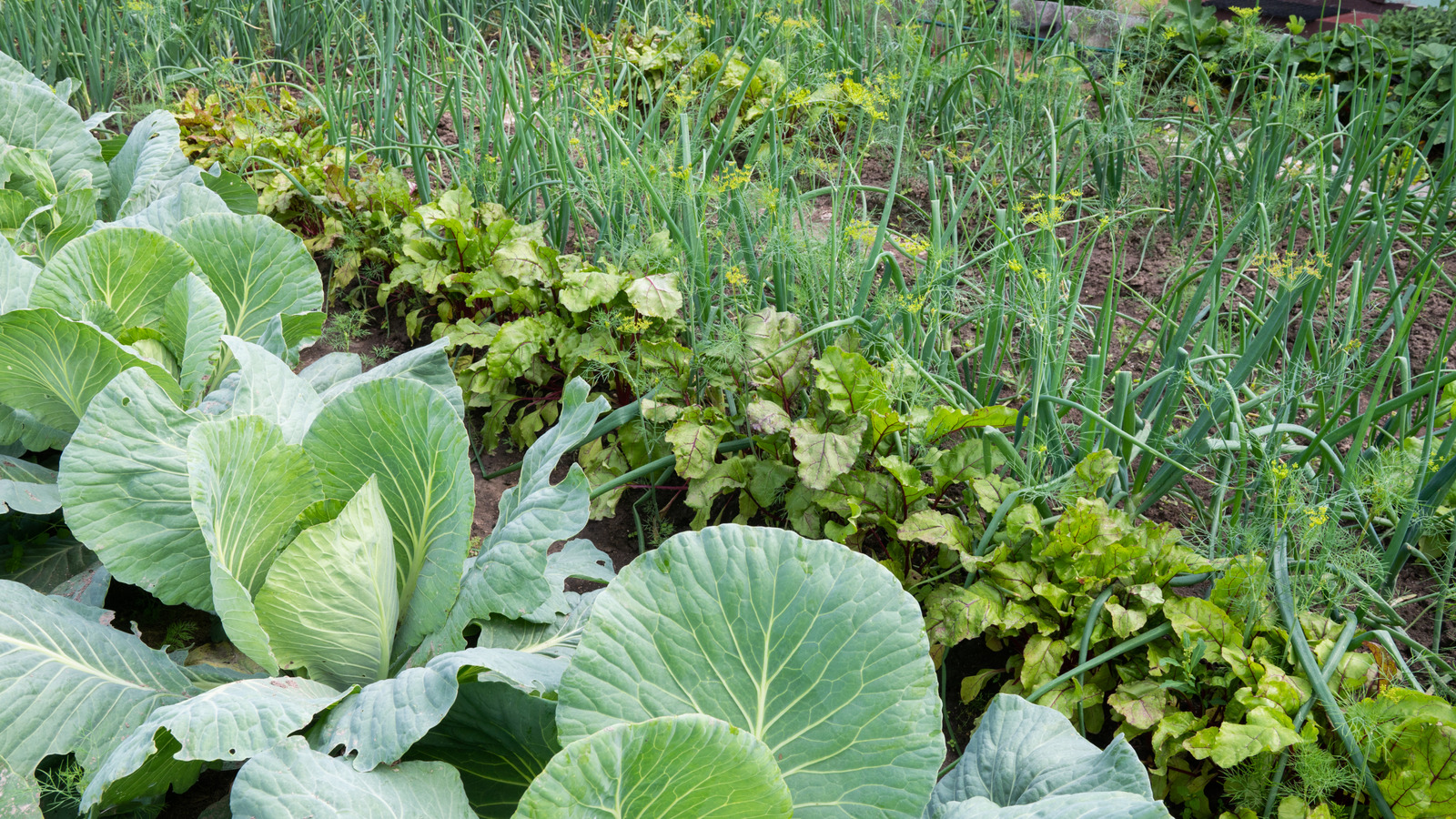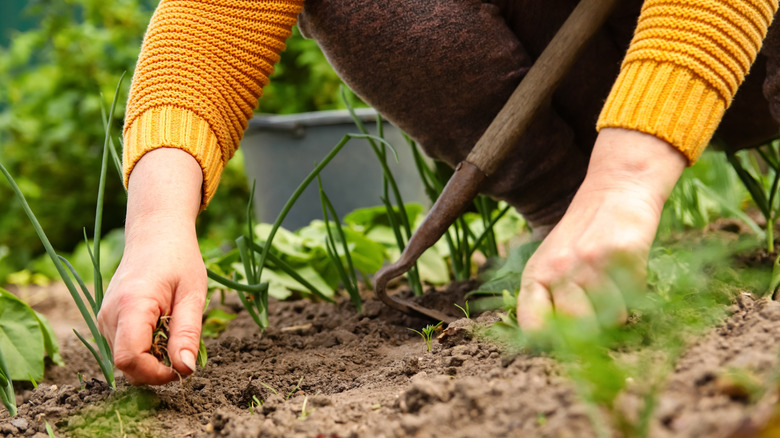Are weeds taking over your vegetable garden and stealing nutrients from your plants? You’re not alone, and the good news is that you can get rid of them—and keep them out for good.
Imagine harvesting healthy, juicy vegetables without struggling to pull out stubborn weeds every day. You’ll discover simple, effective ways to clear your garden and protect your crops. Keep reading, and you’ll learn how to make your garden weed-free, so your vegetables can grow strong and healthy.

Credit: www.housedigest.com
Identifying Common Garden Weeds
Weeds can harm your vegetable garden by stealing nutrients and space. Knowing how to spot common garden weeds helps you remove them early.
This guide explains the types of weeds found in vegetable gardens and their growth patterns. This knowledge makes weed control easier.
Types Of Weeds In Vegetable Gardens
Vegetable gardens often face three main types of weeds: grassy, broadleaf, and sedge weeds. Each has unique features and needs different control methods.
- Grassy Weeds:These have narrow leaves and grow in clumps. Examples include crabgrass and foxtail.
- Broadleaf Weeds:These have wide leaves and often produce flowers. Examples are dandelions and clover.
- Sedge Weeds:These look like grasses but have triangular stems. Nutsedge is a common sedge weed.
Weed Growth Patterns
Understanding how weeds grow helps you control them better. Some weeds grow fast and spread by seeds. Others grow slowly but spread underground.
| Growth Pattern | Description | Examples |
| Annual | Complete life cycle in one season; spreads by seeds. | Crabgrass, Lambsquarters |
| Biennial | Two-year life cycle; grows leaves first year, flowers second. | Wild Carrot, Burdock |
| Perennial | Lives for many years; spreads by roots or seeds. | Dandelion, Nutsedge |
Preparing Your Garden For Weed Control
Weeds compete with vegetables for water, nutrients, and sunlight. Preparing your garden well helps keep weeds away. This makes your plants grow strong and healthy.
Good preparation means less work later. You can stop weeds before they start. Use smart methods to prepare your soil and pick plants that fight weeds.
Soil Preparation Techniques
Start by removing old weeds and roots from the soil. Turn the soil over to break it up and let air in. This stops weed seeds from growing.
- Clear all weeds and roots from the garden area.
- Loosen the soil with a garden fork or tiller.
- Add compost to improve soil health and block weeds.
- Use mulch to cover soil and stop light reaching weed seeds.
Choosing The Right Plants
Pick plants that grow fast and cover the soil. These plants block sunlight from weeds. Some plants can even stop weeds by releasing natural chemicals.
| Plant Type | How It Helps Control Weeds |
| Cover Crops (e.g., clover, rye) | Grow quickly and cover soil to shade weeds. |
| Dense Leafy Vegetables (e.g., kale, spinach) | Shade the ground and reduce weed growth. |
| Herbs (e.g., rosemary, thyme) | Release natural oils that slow weed seeds. |
Manual Weed Removal Methods
Removing weeds by hand helps keep your vegetable garden healthy. This method avoids using chemicals. It is safe and effective for small gardens.
Manual removal takes time but can prevent weeds from spreading. Learning the right techniques makes the work easier and more successful.
Hand Pulling Tips
Pulling weeds by hand is simple but needs care. Grasp the weed near the base to remove the entire root. This stops it from growing back quickly.
- Pull weeds after watering or rain to get soft soil.
- Wear gloves to protect your hands from dirt and thorns.
- Remove small weeds early before they produce seeds.
- Dispose of weeds away from the garden to avoid replanting seeds.
Using Gardening Tools Effectively
Tools help reach weeds in tight spots or tough soil. Use them carefully to avoid harming your vegetables.
| Tool | Use | Tip |
| Hand Weeder | Loosen soil around deep roots | Insert close to root, then lift gently |
| Cultivator | Break up soil surface | Use shallow strokes to avoid vegetable roots |
| Hoe | Cut weeds at soil level | Work on dry soil for clean cuts |

Credit: www.housedigest.com
Mulching For Weed Prevention
Mulching is a simple way to stop weeds in your vegetable garden. It blocks sunlight so weeds cannot grow.
Using the right mulch and applying it well keeps your plants healthy and your garden neat.
Types Of Mulch To Use
Choose mulch that suits your garden and plants. Organic mulches add nutrients to the soil as they break down. Inorganic mulches last longer but do not improve soil.
- Straw or hay: Light and easy to spread, good for vegetable beds.
- Wood chips or bark: Last longer, best for paths and around trees.
- Grass clippings: Quick to apply, but use in thin layers to avoid mold.
- Leaves: Cheap and natural, shred them for better coverage.
- Black plastic or landscape fabric: Blocks weeds well, but does not enrich soil.
How To Apply Mulch Properly
Applying mulch correctly helps prevent weeds and protects your plants. Follow these simple steps for best results.
- Clear the area of existing weeds and debris.
- Water the soil well before adding mulch.
- Spread mulch evenly around plants, about 2 to 4 inches thick.
- Keep mulch a few inches away from plant stems to avoid rot.
- Replenish mulch every few months as it breaks down or blows away.
Natural Weed Control Solutions
Weeds can take nutrients and water away from your vegetables. Using natural methods keeps your garden healthy and safe. These solutions help control weeds without harmful chemicals.
Try homemade herbicides and smart planting to reduce weed growth. These ideas support your garden’s natural balance.
Homemade Organic Herbicides
You can make simple herbicides at home using ingredients from your kitchen. These sprays target weeds but do not harm your vegetables.
- Mix vinegar with a small amount of dish soap to spray on weeds.
- Use boiling water poured directly on weed roots.
- Combine salt and water carefully to spot treat tough weeds.
- Apply corn gluten meal to stop weed seeds from growing.
Companion Planting Benefits
Planting certain vegetables together helps stop weeds naturally. Some plants block sunlight or release substances that reduce weed growth.
| Companion Plants | Benefit |
| Beans and Corn | Beans add nitrogen, corn shades soil |
| Marigolds and Tomatoes | Marigolds repel pests and weeds |
| Carrots and Onions | Onions keep carrot weeds away |
| Cucumbers and Radishes | Radishes help reduce weed seed germination |

Credit: savvygardening.com
Maintaining A Weed-free Garden
Keeping your vegetable garden free from weeds can be challenging. Weeds compete for nutrients and sunlight, making it hard for vegetables to grow.
Regular care and observation are key to managing weeds. By taking early action, you can enjoy a healthy and productive garden.
Regular Garden Maintenance
Regular garden maintenance helps control weeds. This involves routine tasks that keep the garden clean and healthy.
Some tasks include removing dead plants and debris. This limits places where weeds can grow and spread.
- Water plants regularly but avoid overwatering.
- Mulch the soil to block sunlight from reaching weed seeds.
- Pull weeds by hand after rain when the soil is soft.
Monitoring And Early Detection
Monitoring the garden for weeds is crucial. Early detection makes it easier to manage weeds before they become a problem.
Inspect your garden weekly for any signs of weeds. Use tools like a hoe to remove small weeds promptly.
| Detection Tips |
|---|
| Check soil after rain for new weed growth. |
| Look under leaves and along garden edges. |
| Keep a record of problem areas for future reference. |
Frequently Asked Questions
How Do I Naturally Remove Weeds From My Vegetable Garden?
Use mulch to block sunlight and hand-pull weeds regularly. Apply organic herbicides or vinegar on young weeds to avoid chemicals. Maintain healthy soil and plants to outcompete weeds naturally.
What Is The Best Time To Weed A Vegetable Garden?
Weed early in the morning or late afternoon to avoid heat stress. Remove weeds before they flower or seed to prevent spreading. Regular weeding during the growing season keeps your garden weed-free.
Can Vinegar Effectively Kill Weeds In Vegetable Gardens?
Yes, vinegar can kill young weeds by drying their leaves. Use horticultural vinegar for stronger effects and avoid contact with vegetables. Apply on sunny, dry days for best results and reapply as needed.
How Often Should I Weed To Keep My Garden Healthy?
Weed at least once a week to prevent weed growth and seed spread. Frequent weeding reduces competition for nutrients, water, and sunlight, promoting healthy vegetable plants.
Conclusion
Weeds can harm your vegetable garden if left alone. Pull them out early before they spread seeds. Use mulch to stop new weeds from growing. Water your plants carefully to help them grow strong. Keep checking your garden every few days.
A clean garden means healthier vegetables and better harvests. Small efforts every day make a big difference. Stay patient and enjoy the fruits of your work. Your garden will thank you with fresh, tasty veggies.


